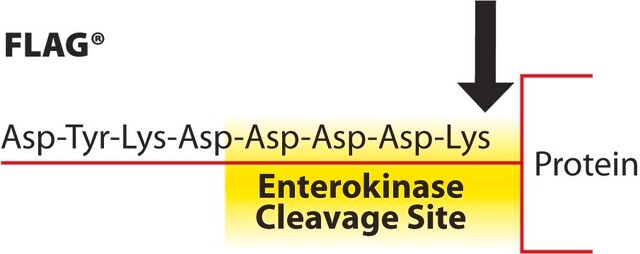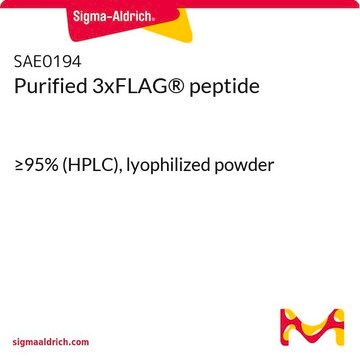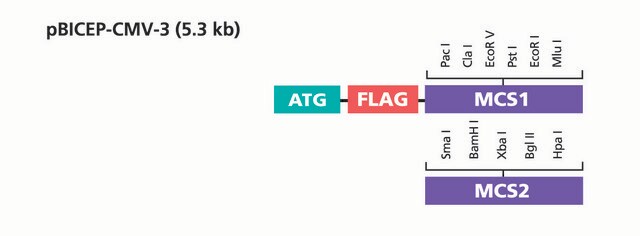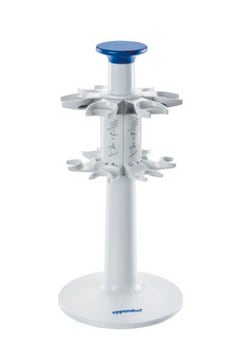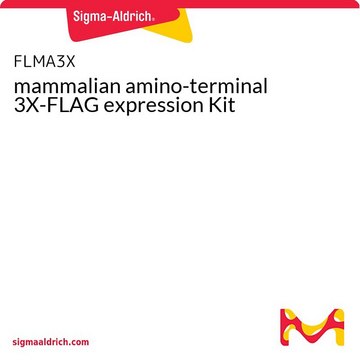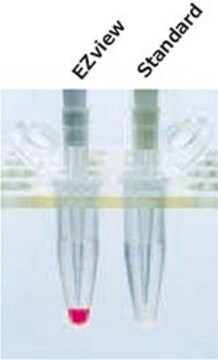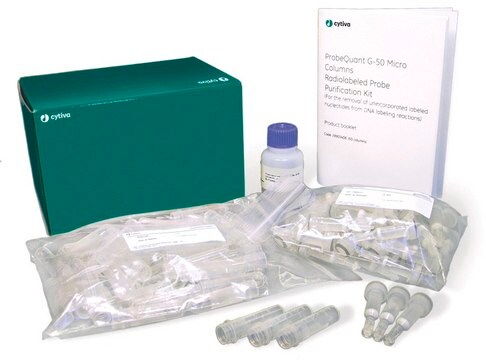E7783
p3XFLAG-CMV™-13 Expression Vector
shuttle vector for transient or stable extracellular expression of C-terminal 3xFLAG
Se connecterpour consulter vos tarifs contractuels et ceux de votre entreprise/organisme
About This Item
Code UNSPSC :
12352200
Produits recommandés
Étiquette/Marqueur
3X FLAG tagged
Qualité
for molecular biology
Forme
buffered aqueous solution
Localisation du marqueur peptidique
C-terminal
Conditions d'expédition
dry ice
Température de stockage
−20°C
Description générale
The p3XFLAG-CMV™-13 Expression Vector is a 6.3 kb derivative of pCMV5 used to establish expression of transient or unstable C-terminal 3XFLAG™fusion proteins in mammalian cells. The vector encodes three adjacent FLAG epitopes (Asp-Tyr-Lys-Xaa-Xaa-Asp) downstream of the multiple cloning region. This results in increased detection sensitivity using ANTI-FLAG?M2 antibody. Efficiency of replication and genomic integration is optimal when using an SV40 T antigen-expressing host.
p3XFLAG-CMV-7-BAP Control Plasmid is a 6.2 kb derivative of pCMV51 used for transient intracellular expression of N-terminal 3X-FLAG bacterial alkaline phosphatase fusion protein in mammalian cells. The vector encodes three adjacent FLAG epitopes (Asp- Tyr-Lys-Xaa-Xaa-Asp) upstream of the multiple cloning region. This results in increased detection sensitivity using ANTI-FLAG M2 antibody. The third FLAG epitope includes the enterokinase recognition sequence, allowing cleavage of the 3XFLAG peptide from the purified fusion protein.
Vector Maps and Sequences
p3XFLAG-CMV-7-BAP Control Plasmid is a 6.2 kb derivative of pCMV51 used for transient intracellular expression of N-terminal 3X-FLAG bacterial alkaline phosphatase fusion protein in mammalian cells. The vector encodes three adjacent FLAG epitopes (Asp- Tyr-Lys-Xaa-Xaa-Asp) upstream of the multiple cloning region. This results in increased detection sensitivity using ANTI-FLAG M2 antibody. The third FLAG epitope includes the enterokinase recognition sequence, allowing cleavage of the 3XFLAG peptide from the purified fusion protein.
Vector Maps and Sequences
Composants
- p3XFLAG-CMV™-13 Expression Vector 20 μg (E4776) is supplied as 0.5 mg/ml in 10 mM Tris-HCl (pH 8.0) with 1 mM EDTA.
- p3XFLAG-CMV™-7-BAP Control Plasmid 20 μg (C7472) is supplied as 0.5 mg/ml in 10 mM Tris-HCl (pH 8.0) with 1 mM EDTA.
Principe
The promoter-regulatory region of the human cytomegalovirus drives transcription of FLAG®-fusion constructs. The preprotrypsin leader sequence precedes the FLAG® sequence.
Informations légales
This product is covered by the following patents owned by Sigma-Aldrich Co. LLC: US6,379,903, US7,094,548, JP4405125,EP1220933, CA2386471 and AU774216.
3xFLAG is a trademark of Sigma-Aldrich Co. LLC
FLAG is a registered trademark of Merck KGaA, Darmstadt, Germany
p3xFLAG-CMV is a trademark of Sigma-Aldrich Co. LLC
Produit(s) apparenté(s)
Code de la classe de stockage
10 - Combustible liquids
Faites votre choix parmi les versions les plus récentes :
Certificats d'analyse (COA)
Lot/Batch Number
Désolés, nous n'avons pas de COA pour ce produit disponible en ligne pour le moment.
Si vous avez besoin d'assistance, veuillez contacter Service Clients
Déjà en possession de ce produit ?
Retrouvez la documentation relative aux produits que vous avez récemment achetés dans la Bibliothèque de documents.
Thomas Seck et al.
The Journal of biological chemistry, 278(25), 23085-23093 (2003-04-11)
Numerous alternatively spliced transcripts are generated from the gene for the G protein-coupled calcitonin receptor, and some of the splice variants show differences in receptor-mediated signaling events. This study showed that the deltae13 splice variant of the rabbit calcitonin receptor
Seakwoo Lee et al.
The Biochemical journal, 403(1), 31-42 (2006-12-21)
Human MMP-26 (matrix metalloproteinase-26) (also known as endometase or matrilysin-2) is a putative biomarker for human carcinomas of breast, prostate and other cancers of epithelial origin. Calcium modulates protein structure and function and may act as a molecular signal or
Rong Hou et al.
The Journal of biological chemistry, 284(11), 6955-6965 (2009-01-10)
Fat1, an atypical cadherin induced robustly after arterial injury, has significant effects on mammalian vascular smooth muscle cell (VSMC) growth and migration. The related Drosophila protein Fat interacts genetically and physically with Atrophin, a protein essential for development and control
Veronica Rondahl et al.
PloS one, 8(9), e73635-e73635 (2013-09-12)
The leucine-rich repeats and immunoglobulin-like domains (LRIG) proteins constitute an integral membrane protein family that has three members: LRIG1, LRIG2, and LRIG3. LRIG1 negatively regulates growth factor signaling, but little is known regarding the functions of LRIG2 and LRIG3. In
Notre équipe de scientifiques dispose d'une expérience dans tous les secteurs de la recherche, notamment en sciences de la vie, science des matériaux, synthèse chimique, chromatographie, analyse et dans de nombreux autres domaines..
Contacter notre Service technique